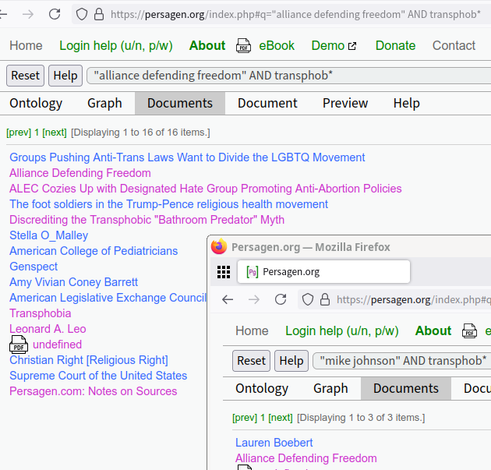After Stewart argued the case at the Supreme Court in December 2021,
leaders of the anti-abortion movement gathered that evening
at the JW Marriott in Washington
for an invitation-only dinner banquet
sponsored by A.D.F.
Everyone from the network seemed to be there,
and A.D.F. gave out party favors of small wooden plaques
depicting a pregnant woman leaning against a Supreme Court column.
The mood was celebratory even though their ultimate victory wouldn’t come for another six months,
with the decision in Dobbs v. Jackson that would overturn Roe.
Marjorie Dannenfelser was in the room.
As were local activists who pushed abortion bans through their statehouses.
Authors of the amicus briefs supporting Stewart’s case.
Becky Currie, who believed she had come up with the idea of the 15-week law in Mississippi.
Many participants knew only the small part they played,
not how the whole fit together.
Currie met Stewart briefly that night for the first time.
“He couldn’t pick me out of a crowd,” she said.
Onstage, Lynn Fitch, Scott Stewart and Erin Hawley sat proudly
as they described how they had gotten to this moment.
“First of all, to God be the glory,” Fitch began.
“We all prayed, worked so hard for this day.
It all came together because everyone here,
everyone that’s been involved across our country,
we’re believers,
and we knew this day would come,” she said.
“God selected this case. He was ready.
The justices were ready to hear what we were all going to be talking about.”
For those listening,
the people around them in that ballroom
and all they accomplished represented
a vision of the kingdom of God
coming on Earth,
as Jesus’ prayer taught in the Gospels.
Their work offered a vision of what a modern Christian empire looked like.
It did not involve violent crusaders or declaring an official state religion.
It was not clerics instituting a theocracy.
The anti-abortion movement had used the existing system to define the Constitution the way it saw fit.
A right was not being taken away from women,
the movement argued,
because it never should have existed in the first place.
Even Ruth Bader Ginsburg had said Roe,
rooted in a right to privacy,
wasn’t built on the strongest legal ground.
An argument explicitly based on a constitutional right to equal protection would have better protected it from challenges, she argued.
A.D.F.’s strategy on Dobbs reflected how it believed it could reshape America
and overtake majority opinion.
There’s a saying that law is downstream from culture,
said Greg Scott, a former longtime communications strategist for A.D.F.,
explaining the idea in an interview that a cause gains popular support first
and then the law formalizes those beliefs.
“I actually reject that,” he said.
“We are in this feedback loop and this ecosystem where frequently that is true.
But then at other times, the law does drive culture.”
(13/n)
#Waggoner #Hawley #Barrett #Stewart #Fitch #Currie #Taylor #Fiedorek #Burke #Dannenfelser #AllianceDefendingFreedom #fedsoc #FederalistSociety #viability #Roberts #Kennedy #Alito #Leonard #Leo #Misha #Tseytlin
![[thread] Alliance Defending Freedom
https://en.wikipedia.org/wiki/Alliance_Defending_Freedom
* SPLC: anti-LGBT hate group
* conservative Christian legal advocacy group
* works to:
expand Christian religious liberties/practices in public schools, gov't
outlaw abortion
oppose 2SLGBTQIA+ rights
* opposes same-sex marriage
decriminalization of same-sex sexual activity
anti-discrimination laws
* model anti-transgender bills for state legislators
#ChristianRight #Christofascism #antiLGBT #transphobia #transgenocide #ModelActs #GOP](https://files.mastodon.social/media_attachments/files/113/692/829/146/796/791/small/6f30130a86a7435b.png)
